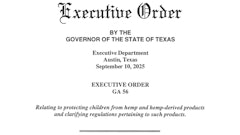
While it’s likely that farmers will have one more year to operate under their pilot programs after Congress passed an extension through 2021, some states are moving forward anyway.
One of those is Connecticut. Gov. Ned Lamont recently signed a bill to revise the state’s program to comply with the Agriculture Improvement Act of 2018 (the 2018 Farm Bill).
The state’s new hemp plan is still under review by the U.S. Department of Agriculture (USDA).
One of the main revisions of the program is changing the license fee structure for producers. Under the old law, growers paid $50 per acre of planned hemp plantings; now, fees are $450 for the first acre of planned hemp production and $30 for each additional acre (rounded to the nearest acre) with a cap at $3,000.
Manufacturer license fees have also increased to $75 for filing an application, up from $50, and $375 for a license, up from $250.
The new law also extends the licensing period for producers and manufacturers from two to three years. In addition, it also removes the set $250 fine for producing hemp without a license and instead makes it an infraction, which is typically punishable by fines of between $35 to $90, plus a surcharge and additional fee based on the amount of the fine. The new law does, however, does maintain the set $250 fine amount for manufacturers operating without a license.
The law also eliminates the requirement that hemp growers only use certified seeds. Read the full legislation below.
Connecticut began its pilot program in June of 2019. That year, the state had licensed 82 hemp growers and two processors. That number increased slightly this year to 109 licensed growers and 10 processor licenses, according to data obtained by Hemp Grower.
CT Hemp Law by Tess Bennett on Scribd



























